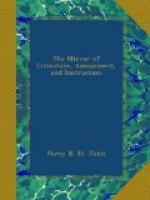acquire the real mastery of the British Channel—gloriously
send forth fleets that went and conquered, and never
sullied the union flag by an act of dishonour or dissimulation.
Not a single Briton, during the protectorate, but
could demand and receive either reparation or revenge
for injury, whether it came from France, from Spain,
from any open foe or treacherous ally; not an oppressed
foreigner claimed his protection but it was immediately
and effectually granted. Were things to be compared
to this in the reign of either Charles? England
may blush at the remembrance of the insults she sustained
during the reigns of the first most amiable, yet most
weak—of the second most admired, yet most
contemptible—of these legal kings.
What must she think of the treatment of the elector
palatine, though he was son-in-law to king James?
And let her ask herself how the Duke of Rohan was
assisted in the Protestant war at Rochelle, notwithstanding
the solemn engagement of king Charles under his own
hand! But we are treading too fearlessly upon
ground on which, in our humble capacity, we have scarcely
the right to enter. Alas! alas! the page of history
is but a sad one; and the Stuarts and the Cromwells,
the roundheads and the cavaliers, the pennons and the
drums, are but part and parcel of the same dust—the
dust we, who are made of dust animated for a time
by a living spirit, now tread upon! Their words,
that wrestled with the winds and mounted on the air,
have left no trace along that air whereon they sported:—the
clouds in all their beauty cap our isle with their
magnificence, as in those by-gone days; the rivers
are as blue, the seas as salt; the flowers, those sweet
things! remain fresh within our fields, as when God
called them into existence in Paradise, and are bright
as ever. But the change is over us, as it has
been over them: we, too, are passing. O England!
what should this teach? Even three things—wisdom,
justice, and mercy. Wisdom to watch ourselves,
and then our rulers, so that we neither do nor suffer
wrong; justice to the memory of the mighty dead, whether
born to thrones or footstools; mercy, inasmuch as
we shall deeply need it from our successors.
* * * *
*
THE “WHY AND BECAUSE” OF CHRISTMAS.
[We can vouch for the abridgement and collation of
the following facts, connected with this joyous season
of old. Probably a few of the notes may have
been discussed in the course of our twenty-volume career;
but to omit such notices on the present occasion,
would be to drop a link in the little chain:]
Why is the evening before Christmas-day celebrated?
Because Christmas-day, in the primitive Church, was
always observed as the Sabbath-day, and, like it,
preceded by an eve, or vigil.—Brand.
It was once believed, that if we were to go into a
cow-house, at twelve o’clock at night, all the
cattle would be found kneeling. Many also firmly
believed that bees sung in their hives on Christmas-eve,
to welcome the approaching day.




